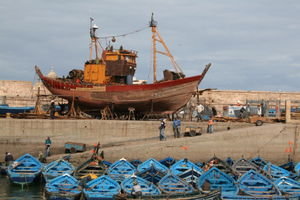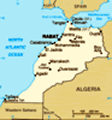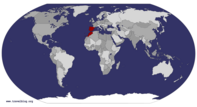Advertisement
Published: April 12th 2008

 The Port at Essaouira
The Port at Essaouira
Bobbing boats and high dry hullsA blast of wind welcomes me as I open the van door. Sand whirls across the dusty car-park where we're stopped forming miniature sand-banks in the corners of the low surrounding wall. The wind blows the sand with such force that as it hits the wall it ricochets upwards in a fountain of dust that gives the violent air visible form. Its windier than normal, here in Essouaira, otherwise known as 'windy city' and along the sea-front is where it is most ferocious. But there is respite. The medina is a hive of activity, a hotch-potch of vendors selling everything you could possibly need. Fancy a pigs leg to suck on, complete with trotter - look no further! There is a thriving cafe culture here, not least because of the hundreds of tourists that flow through the town. Order a glass of mint tea in a sheltered spot and watch the world go by.
From my vantage point in a shady cafe I was really struck by the attitude towards those with very little. As observers of the Qu'aran, the Moroccan people are generally a happy nation. Although there is no welfare state, Muslims have a duty of care to

 Rug Souk
Rug Souk
One of souks illustrated by Will. the homeless and disabled. The thought of pushing old people into nursing homes is unthinkable but this makes the need to have a large family who can support elderly parents in their old age a necessity. The locals have an amiable approach to the disabled who display themselves along the street and often quite cheerily ask for a Dirham. Rather than being perceived as a nuisance or underclass, the elderly and disabled in Morocco are treated as human beings.
Talking of nuisances, the Moroccan border control wasn't as hair-raising as we had been led to imagine. We chose the Algeciras to Ceuta crossing. After chatting with various people in Spain it seemed that a land border was preferable to a sea-border, such as that at Tangier. We also figured that Ceuta would be a lot less hectic. It was. Our ticket cost 200 Euros for two people and a camper. At the frontier post, after a short drive through town we were met by a crowd of touts trying to persuade us to stop there and give them our passports. We ignored them and carried on through the gates into the Frontier proper. We then had to fill in

 Oualidia
Oualidia
A stormy looking lagoona few forms. We tried to do it on our own but our French is crap, so in the end enlisted the help of one of the guys hanging around who spoke English. We had been advised to make sure we had a few 5 Euro notes just to help us on our way through control, so we were expecting to have to spend a little here. As it was we gave the guy 5, and that was that. Job done and we were through. Probably took about an hour. Basically, keep your wits about you, a little common sense and don't get taken for a fool, and you'll be fine. The border crossing was the thing we were most anxious about, and in the end it was no trouble.
The coast road stretching from Tangier to beyond Agadir is a dream. We took the peage. Being (relatively) wealthy Brits it was a cheap and efficient way of getting us moving. Much better than the pot-holed excuse for a road that twists and turns through the mountains from Ceuta to Tangier we had inadvertently driven the night before. Amazingly, fuel only costs about 50p a litre which means a

 Our Mate Ahmed
Our Mate Ahmed
Ahmed, camper stop guardian extraordinairelot more miles for your money. Two tanks of fuel, a campsite and a tasty fish dinner of sole only set us back £65. Which if you think about it, ain't bad.
We spent a few days at the coastal resort of Oualidia camped over-looking the a beautiful lagoon in a make shift park up. It is, as the guide book says a picturesque resort for a mainly Moroccan clientel. From here we could watch the eight foot waves crashing over the rocks, and watch the tidal comings and goings of the ocean.
There is rarely a place, particularly in the north of Morocco where you can camp for free and the police will move you on if parked on the road side. The locals are switched on to the presence of those in vans and make the most of it. Most places you go, makeshift secure parking zones have been created by enterprising Moroccans. Our park up in Oualidia was run by Ahmed, and for 20 Dirham a night (that's 2 Euros) we were assured of a safe nights sleep. He also would collect water for us and even emptied our loo for us, ignoring our protestations.
At this point we realised there was another currency that was even more potent than the Euro. Finkbrau Lidl beer. Had we known we'd have brought several slabs with us. In Spain a stubby only costs the equivalent of 20p but its almost priceless here. Will was also offered a whole sack of really good carrots if he could swap a t-shirt or any other item of clothing. This fact has been made all the more annoying as I threw out bags of clothes before I left England. If only we'd brought them here we could have bartered our way round Morocco.
Here in Essaouira we have been hanging out with the local artists. With no painting tradition as such, the artists are keen to learn new techniques and share their language with us. We can now count to three and ask for mint tea in Arabic. Will can go one better and ask for coffee as well. Being male, Will had greater access to the delights of Arabic life and he's spent quite a lot of time hanging out in back street billiard halls where Abdul, our painter friend, was known as a bit of demon. With drinking

 Abdullatif
Abdullatif
Abdul has a pitch in the main square in Essaouira. He and Will got on really well and he's a bit of a demon with a pool cue.and dope smoking not acceptable in public, the poole hustlers instead snack on baked chickpeas and sugary peanuts from newspaper cones, leaning hunched against the shabby tiled walls watching the other players through the cigarette heavy gloom.
Emerging from the darkness of the medina's tunnel-like back streets, the luminous light that saturates the town is startling. It bounces off the stark white angular shapes of the rhiads and houses in the medina, forming a 'melange' (Will's favourite new French word) of line, tone and contrast. All the shutters, window frames and doors are painted in a blue unique to this town, a beautiful colour that lies somewhere between cerulean blue and manganese. Sacks of the powdered paint can be found amongst other bricolage in the souks. Together they form a very pleasing aesthetic cohesion found in few other towns in Morocco.
The boats in the small port that fronts the town are also painted in hues of this magical blue. Bobbing on the water in rhythm with the waves, the little boats are swooped on by seagulls waiting for fish scraps thrown out by the fishermen. Sea faring vessels lie beached in the harbour awaiting maintenance or complete

 Blue Boats a Bobbing
Blue Boats a Bobbing
Fishermen doing their thangrebuilding looking more like something out of Mad-Max than working boats. Fish can be bought for pence down at the harbour direct from the fishermen, and this is a much better bet than buying in town. More often that not we opted for the fresh fried sardine sandwiches complete with salsa and piquante sauce, a bargain at 4 Dirham or 30p each found sold in the souk rather than the overpriced rubbish aimed at tourists.
After several weeks without a proper shower, instead surviving on the ubiquitous 'whore's wash' (otherwise known as 'pits and bits'), I was propelled through necessity more than anything else, into the hammam. Hammam's or public baths are found all over Islamic countries and provide a convenient way to wash with plenty of hot water. My soft European sensibilities however, proved to not be quite cut out for the rigours of the hammam. Not entirely sure of protocol, I stripped off down to my pants in the changing room and entered through an embossed white door. I wasn't quite prepared for wave of heat that hit me. It also seemed very dark as my eyes adjusted to the light. Peering through the steamy haze, I

 Mad Max Ahoy
Mad Max Ahoy
See what I mean?was able to make out an elderly woman at her bath and a mother and her offspring. In this instance the child, lying face down on the low, tiled perimeter ledge, was being scrubbed like I've never seen before, a continuous hard scrub, up and down the back for at least 5 minutes, probably more.
I was motioned to the water and I filled my bucket. Walking through to the adjacent steam room, I set about dousing myself with water, which turned out to be unbelievably hot! I don't know how the local woman handle it. Years of practice I presume. Muslim women must have absolutely beautifully soft skin. The proper routine is to steam yourself for a while, Then wash yourself and your hair, at this point you are meant to have a proper scrub with a natural black soap, preferably with the assistance of a friend who can do your back. Then you dowse yourself with cold water, wash your hair again and then get rubbed with Argan oil, or some other massage oil. I just sort of washed myself in a rather clumsy fashion, struggling with massive buckets of water and then chucking them over myself.

 Making a Guenbri
Making a Guenbri
Bumped into this friendly chap whilst wandering around Essaouira and he didn't want to sell me anything either. He's stretching the a skin over a wooden frame to make an Guenbri a guitar/bass like instrument with two or three strings. It is used in Gnawa music.I can't emphasise enough how hot it all was. Whilst I was in there, a couple of women came in and ran the hot water tap to create more steam. I have to say I've never really been one for saunas, and when I emerged into the bright light of day, I had turned into a beetroot. I walked back to the van with what felt like steam coming out of my ears, lay down and proceeded to get a ronking headache and was layed out for the rest of the day. So unfortunatley I don't think I'm going to go out of my way to visit a hammam again in the near future, give me a simple shower any day!
Essaouira has many more tourists than the last time we visited five years ago but it still holds immense appeal. Its a creative hub in Morocco and people move here because of its laid back vibe. Unfortunately though, because of the influx of Europeans many locals can't afford to live in the old Medina, living instead in the sprawling town outside the city walls. Not wanting to spend all our time in a tourist ghetto, we have ventured out of the Medina into the 'real' Essaouira. There was a two day festival that involved all the unmarried women congregating in the street. A man then rides along on a horse and the family pays the man for a strand of the horses hair for good luck in finding a bride. We missed that bit but there was a massive market on which only happens for two days of the year. It was exciting being amongst the people and buzz of the town. So many different faces. From the rude-boys selling their produce who could be dahn Brixton - one guy was enthusiastically selling underpants having two pairs pulled on and one on his head, much to the amusement of the giggling crowd; to the multitude of women swarming like bees over the vendors delights, displayed in make shift tents, on the roadside on tarps or at little stalls cobbled together out of an assortment of planks and nails.
Walking down the road, I realised I was having a significantly different experience to normal- I could see over peoples heads! I could see right into the distance instead of being jammed up against backs and shoulders, the view ahead barred, I became aware of how small most of the people were. The women especially were tiny. I saw one Berber girl with blue eyes and a 'reddish' complexion what I mean by that is a sort of warm amber colour - quite beautiful. I imagine she had a light auburn, coppery coloured hair. We've seen a lad with dark red hair here and its obviously a trait that runs through the Berber tribes. In contrast is the strange habit of wearing a lighter coloured foundation on the skin, resulting in a ghost-like grey looking face - lacking in any warmth or naturalness. This seems particularly popular among aspiring middle class Arabic women, for whom a pale face is considered more desirable than a dark one.
Abdul was so generous and kind. He bought us some sugar candy from one of his relatives. We'd bought similar in the Medina the previous night which I scoffed greedily giving me a clicky jaw and sugar hang-over in the morning. The candy Abdul bought however, was an altogether different quality. It was a bit more squishy and less jaw breaking. He bought me a little ring and a stick 'for women'. He sort of said (or indicated) that I need to suck or chew it and then smear it on my lips. I can't work it out myself - nor can Will who has undone the bundle and discovered lots of grass like bits in it. I think it will remain a mystery. For now at least.
Advertisement
Tot: 0.102s; Tpl: 0.012s; cc: 12; qc: 48; dbt: 0.0592s; 1; m:domysql w:travelblog (10.17.0.13); sld: 1;
; mem: 1.2mb









jen
non-member comment
Slave Trade
For centuries there was an active slave trade with pirates from Morocco raiding the caostline around Britain. Estimates that about one million Europeans were captured and traded, sold in slave markets throughout north Africa. Some returned and write about their lives selling the small volumes to make a living. Some were offered rescue and took it but some declined as they were well treated and lived well in positions of trust with their masters. Read 'White Gold' by Giles Milton. He explores the tale of one slave Thomas Pellow. I mention this because this may account for the fair skin and blue eyes you describe.